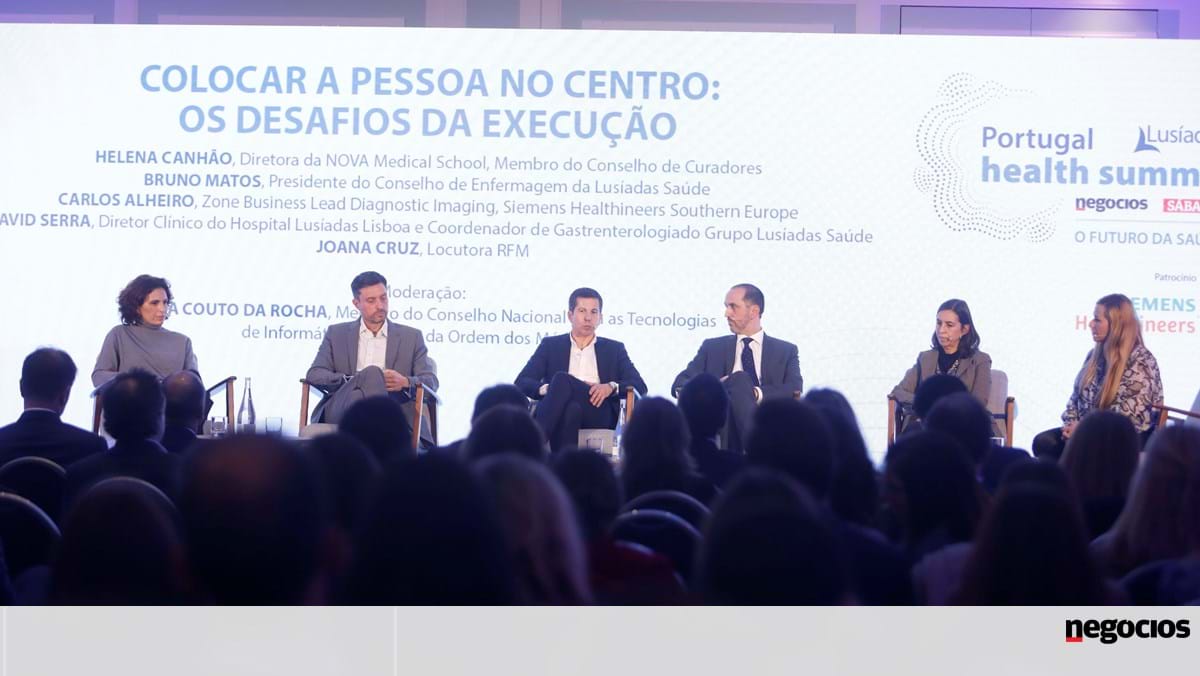Artificial intelligence, big data, the Internet of Medical Things, digital twins… Technological advances are revolutionizing healthcare in ways that would have been difficult to imagine not so long ago. Indeed, as experts attending the 2nd Health Summit in Portugal showed, the digitalization of healthcare increasingly allows remote monitoring and treatment of patients, and advanced algorithms promise to enhance the doctor's ability to perform predictive diagnoses, virtual simulations and personalized treatments.
It is now indisputable that healthcare technology and digital transformation are redefining healthcare delivery, clinical and operational efficiency, clinical decision support and, above all, transforming the patient experience.
“The new era of patient experience” was precisely the slogan of the intervention of Siemens Healthineers Portugal CEO, Jorge Oliveira, who opened the discussion immediately after the welcome from Revista Sábado Director, Nuno Thiago Pinto. Although technological resources and solutions are becoming increasingly more numerous and effective, “challenges, especially those related to equity, remain,” the director warned. “Having a stroke in Lisbon is not the same as having a stroke in Alentejo or the Algarve,” the Siemens Healthineers CEO noted, adding that “there is still a way to go.” The solution lies in “the interconnectedness between different stakeholders and agents in health”, which in his opinion is “essential and life-saving”.
During the event, Carlos Alheiro, Head of Diagnostic Imaging Business Area at Siemens Healthineers, Southern Europe, shared the “Record Notes: A World View”, about the global impact of technological advances in healthcare. Addressing some of the innovations that the company has made available to users, and providing them with better experiences, the responsible person stressed that “technological progress will allow healthcare professionals to enhance the human aspect and human touch and gain more room for empathy with the patient.”
In one of the most provocative interventions, machine learning researcher Miriam Siwan Santos asked the audience whether data saves lives. Big data in medicine, focusing on how these tools can speed up diagnosis and save lives.
As the specialist explained, “access to this data from technology allows a greater possibility of collaboration between the various participants in the system, which contributes to increasing knowledge, updating clinical guidelines, exchanging data and facilitating research, which represents a big step towards personalized medicine.” “This will allow us to treat each patient according to their characteristics, which is not only more effective, but also more humane.”
Implementation challenges
After a break for an “immersive experience”, we delve into a hands-on demonstration of one of the innovations discussed during the event, “Time is the Brain Experience”, followed by a roundtable by Helena Canhau, Director of the Nova School of Medicine; Bruno Matos, President of the Nursing Council of Luciadas Saudi; David Serra, Clinical Director of Hospital Lusíadas Lisbon and Coordinator of Gastroenterology at Grupo Lusíadas Saúde, Carlos Alheiro and Joana Cruz, presenter at RFM. Moderated by Sofía Couto da Rocha, Member of the National Council for Health Information Technology of the Medical Association, the challenges faced in implementing “Putting the Person at the Center” were discussed.
Helena Canhao considered that “there is a tremendous development” and that “the patient is already at the center of the system, as the system is increasingly moving towards individual medicine.” In turn, Bruno Mattos warned that “we need to view human care and technology as two pillars that support health – never as mutually exclusive.”
“Precision medicine, no matter how better or faster it is, does not replace compassion and humanity,” David Serra noted. Kallos El Hierro endorsed this same idea, highlighting the need to “use technology in order to increase the human touch and give the patient a seat at the table where they can participate in managing their health” and Joanna Cruz, whose experience as a patient who died due to her breast cancer diagnosis, left wanting to That technology increasingly benefits citizens, without “losing the human aspect.”
The conference culminated with a “Conversation with…” Vasco Antunes Pereira, CEO of Lusíadas Saúde, moderated by journalist Helena Garrido. The leader highlighted the role of technology as “enhancing all stages of our lives,” also highlighting the importance of “co-creating our health – technology gives us this power and this duty.” He believes that it is necessary to “gain more and more individual accountability,” considering that “technology is also an opportunity to be more responsible for our health.”

“Writer. Analyst. Avid travel maven. Devoted twitter guru. Unapologetic pop culture expert. General zombie enthusiast.”

